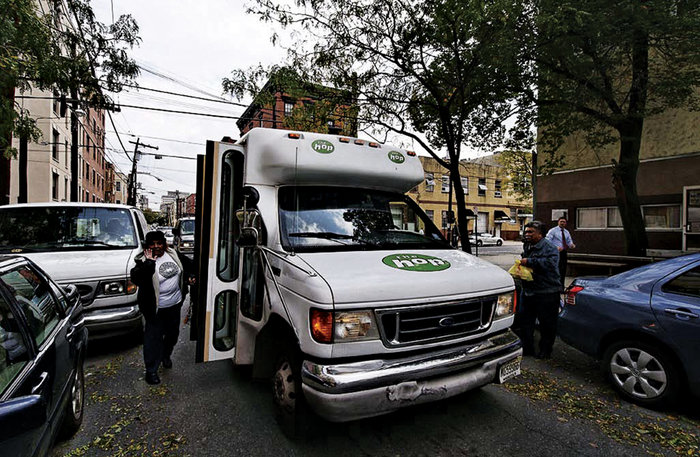The City Council will vote May 16 on a bond ordinance to expand the Hop shuttle bus system, according to town officials. The ordinance, which received only five votes during its introduction, will need six votes – including one from the council minority, traditional opponents of Zimmer – to be adopted.
Transportation and Parking Director Ian Sacs said the bond, approximately $450,000 if approved, will buy five new shuttle buses and a “bucket truck” to help with the repair and installation of traffic signals.
There are currently three Hop shuttle buses that travel along different routes throughout the city. The shuttles service three routes, which are indicated by the red, blue, and green signs that decorate each bus. Currently, the shuttles only travel weekdays and charge a $1.00 fare. The red route also operates as a daytime shuttle for senior citizens, who can ride free of charge.
“I have no problem buying the buses, but I’m not going to bond for them.” – Councilman Michael Russo
____________
“We have five vehicles right now and they’re all on their last legs,” said Sacs, adding that the Hop system initially made use of existing buses. “Most of the [vehicles] are ten or more years old and in very, very rough condition.”
“We’re spending a lot of money on maintenance and unexpected repairs,” he said. “They break down a lot and that affects reliability.”
Three of the five buses would be used to replace the three shuttles currently traveling around the city, according to Sacs. The additional two vehicles would be used either for backup in case a traveling vehicle breaks down, or to double-up on routes during peak periods.
“We need to solidify the reliability of our preexisting routes,” said Sacs.
Sacs said that the new vehicles will also include other accommodations, such as a lower floor and wheelchair accessibility.
High demand yields growth
Town officials said that the shuttle system also needs to be expanded because of the high demand.
“We’ve had fantastic growth in ridership,” said Sacs, “but the data show that we’ve hit a plateau.”
“That plateau is as a result of people not finding the system as reliable as it could be,” Sacs continued, “and the greatest factor of that is that the [buses] are breaking down all the time.”
Sacs also said that the acquisition of new buses would allow the city to continually expand on the system, such as adding new routes. Such ideas for routes would include a “Shop Hop” that would ride along Washington Street and other commercial districts, or an additional senior shuttle independent of the red Hop bus.
“At the moment we can’t do [this],” said Sacs. “We don’t have enough resources, and that’s [why] we’re asking the council to approve this bond.”
Opposition to bonds
The way they want to fund the expansion, however, has not been without opposition.
An ordinance was introduced at the March 21 council meeting to issue a bond in order to fund five new buses. The ordinance received the required 5 out of 9 votes, each by a member of the council typically aligned with Mayor Dawn Zimmer. The four “no votes” came from Council members Michael Russo, Beth Mason, Theresa Castellano, and Timothy Occhipinti, who are typically vocal opponents of the mayor.
For the bond ordinance to be adopted, however, it requires six votes from the council, or a “supermajority.” If the vote received on the introduced ordinance remains the same, the bond initiative would fail by one vote.
Russo explained in an email to the Reporter that he is opposed to funding the buses with a bond, which would create more debt.
“Why would you increase the debt of the city when you have the money to buy the buses outright,” asked Russo, adding that the parking utility loses money each year. “I have no problem buying the buses, but I’m not going to bond for them.”
Sacs said that the buses are referred to “useful life” assets, or ones that continually give over time.
“A shuttle bus will be providing to the community over a period of five to ten years,” said Sacs, who added that it consequently makes sense to fund them over that same period. “The traditional way to handle [that type of] item is to finance them through a municipal bond.”
Sacs also repeated his earlier statements from a council meeting last April, claiming that the Parking Utility surplus had to be diminished to the contribute to the city’s cash surplus after a vote to refinance the Midtown Parking garage received only five of the six votes required, all from Zimmer’s allies.
“It’s kind of a critical thing,” added Sacs. “It’s a strange situation to be put in. We were forced to relinquish all those funds last year, but now we’re being asked [by the council minority] to spend money that [they] already spent.”
Sacs also said that the Hop does not create profit for the city.
“There’s no transit system in the world that sees a profit from a [system that utilizes] fare box collections,” said Sacs, comparing it to a municipality’s recreation department. “It’s just like any other service that a government entity provides to a community.”
Stephen LaMarca may be reached at slamarca@hudsonreporter.com.
